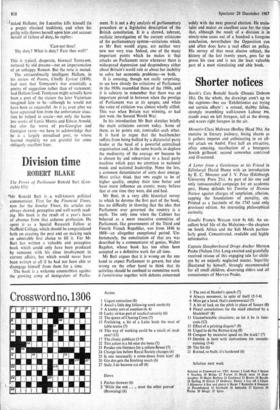Division time
ROBERT BLAKE
1314h Ronald Butt is --a well-known political commentator. First for the Financial Times, now for the Sunday Times, his articles are always shrewd, perceptive and well worth read- ing. His book is the result of a year's leave of absence from that arduous profession. He spent it-- as a Special Research Fellow at Nuffield College, which-should be congratulated both on creating the post and on making such an admirable -first choice to fill it. For Mr Butt has written a valuable and perceptive book which could only have been produced by someone with his close involvement in current affairs, but which would never have been written at all if he had not been able to disengage himself from them for a time.
The book is a welcome counterblast against the growing army of denigrators of Parlia-
ment. It is not a dry analysis of parliamentary -procedure or a legislative description of the British constitution. It is a shrewd, tolerant, realistic investigation of the current criticisms of the parliamentary system—criticisms which, as Mr Butt would argue, are neither very new nor very true. Indeed, one of the many important points which he makes is that attacks on Parliament recur whenever there is widespread depression and despondency either about Britain's world role or about her inability to solve bet economic problems—or both.
It is amusing, though not really surprising, to see how closely the criticisms of Parliament in the 1930s resembled those of the 1960s, and it is salutary to remember that there was an important period in between when the prestige of Parliament was at its apogee, and when the voice of criticism was almost wholly stilled. This was when Britain was winning, or had just won, the Second World War.
In his introduction Mr Butt sketches briefly the main criticisms current today. Some of them, as he points out, contradict each other. It is hard to argue that the backbencher suffers from being bullied by a dictatorial party leader at the head of a powerful centralised organisation and, in the same breath, to deplore the mediocrity of the average MP because he is chosen by and subservient to a locaL party machine which pays no attention to national needs and national leadership. None the less, a common denominator of sorts does emerge. Most critics think that MPs ought to be of higher quality, employ their time better and have more influence on events; many believe that at one time they were, did and had.
Mr Butt, in a very able historical survey to which he devotes the first part of the book, has no difficulty in showing that the idea that Parliament ever governed the country is a myth. The only time when the Cabinet has behaved as a mere executive committee of Parliament, like governments of the Third and Fourth French Republics, was from 1846 to 1868—an altogether exceptional period. Un- fortunately, the constitution of that era was described by a commentator of genius, Walter Bagehot, whose book has too often been accepted as a definitive work for all time.
Mr Butt argues that it is wrong on the one hand to expect Parliament to govern, but also wrong on the other hand to think that its activities should be confined to committee work ramericaine together with debates concerned
solely with the next general election. He main- tains and makes an excellent case for the view that, although the result of a division is in ninety-nine cases out of a hundred a foregone conclusion, nevertheless the Opposition can and often does have a real effect on policy. His survey of that most elusive subject, the history of the last twenty years, goes far to prove his case and is not the least valuable part of a most stimulating and able book.










































 Previous page
Previous page